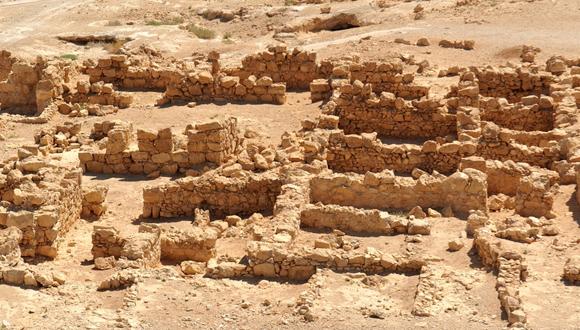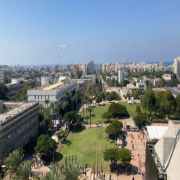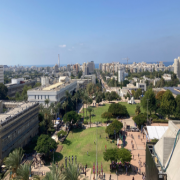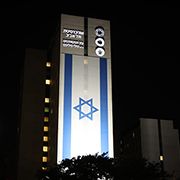King University joins TAU-German Lautenschläger Azekah Expedition
King University has been granted acceptance into an Israeli-German led archaeological expedition of the biblical site of Tel Azekah in Israel.
King University has been granted acceptance into the Lautenschläger Azekah Expedition, an Israeli-German led archaeological expedition of the biblical site of Tel Azekah in Israel. King will join with 15 other universities from across the globe to participate in the Tel Azekah project.
The Azekah excavation is a joint Israeli-German project that brings together the Department of Archaeology and Ancient Near Eastern Cultures of Tel Aviv University and the Wissenschaftlich-Theologisches Seminar of Heidelberg Universität. The project will integrate archaeological fieldwork and theory with contemporary biblical and historical knowledge of the Judahite Lowland Region (Shephelah) to shed light on some of the most intriguing riddles in its history throughout the second and first millennia BCE.
“We are pleased to be a part of the Lautenschlager Azekah Expedition,” said Dr. Greg Jordan, president of King University. “This type of access to collaborative research is a special opportunity for King University students and faculty. The international collaboration through the Lautenschläger Azekah Expedition and its consortium of world class scholars has opened the pathway for the future development of the King University Center for Middle Eastern Studies as well as research opportunities for our students.”
“A benefit of being a member of the consortium is that students have access to Tel Azekah. Students would travel with me to Israel; they would dig for two or three weeks followed by a week-long tour of Israel. If they want to continue studying, Tel Aviv University will train students to be biblical archeologists. The students can then return the next season to be area supervisors at Tel Azekah excavation. This training is long-term, but the benefits are immense. With access to digs being extremely limited, now, becoming an archaeologist can prove challenging. For our students who have an interest in becoming an archaeologist, the hands-on dig experience with the Lautenschläger Azekah Expedition, with the superior training available, would allow them to become qualified archaeologists. And, being on an actual dig is by far the best way to know if this is truly the right career path for anyone interested in becoming an archaeologist,” said Dr. Don Michael Hudson, associate professor of Religious Studies and chair of Philosophy and Religion at King University.
“For King, this means students, faculty, graduates, or anyone who would like to come to King to do a Fellowship will have access to this site to perform research,” commented Hudson. “I have two students who are currently working on research projects.”
 During the expedition, students would spend time each day at the dig site. They would also learn about cleaning and analyzing pottery and scientific analysis techniques for items discovered. Students will also participate in on-site lectures with world-class archaeologists. Previous lecturers have included Dr. Aren Maeir, professor at Bar Ilan University and director of the Tell es-Safi/Gath Archaeological Project for the past 15 years. In addition to his lecture, Dr. Maeir gave participants a personal site visit of Gath to the Tel Azekah participants.
During the expedition, students would spend time each day at the dig site. They would also learn about cleaning and analyzing pottery and scientific analysis techniques for items discovered. Students will also participate in on-site lectures with world-class archaeologists. Previous lecturers have included Dr. Aren Maeir, professor at Bar Ilan University and director of the Tell es-Safi/Gath Archaeological Project for the past 15 years. In addition to his lecture, Dr. Maeir gave participants a personal site visit of Gath to the Tel Azekah participants.
After the seasons dig is completed, all materials are transported back to Tel Aviv University. The professors and assistants, including pottery experts, catalog everything discovered at the dig site and upload the scientific data to their closed website. Members of the consortium have been granted access to this website.
The dig is led by three archaeologists: Dr. Oded Lipschits from Tel Aviv University, director of the Institute of Archeology and professor for Jewish History in the Jacob M. Alkow Department of Archeology and Ancient Near Eastern Civilizations, and Dr. Yuval Gadot, director of the Er-Ras Archeological Project in the Repha’im Valley Jerusalem; and Dr. Manfred Oeming, professor of Old Testament Studies and Ancient Jewish History at Heidelberg Universität.
The two lead universities, Tel Aviv and Heidelberg, have formed a consortium with the intent of bringing together a world class team of international scholars, students, and adventurers from around the globe. The consortium consists of 16 universities. Only four U.S. schools have been granted acceptance into the consortium. Along with King University, the other three U.S. participating schools include Duke University, The University of Iowa, and Moravian College (including Moravian Theological Seminary). International schools include Collège De France, Georg-August-Universität-Göttingen, Heidelberg Universität, Julius-Maximilians-Universität Würzburg, Macquarie University, Rheinische Friedrich-Wilhelms-Universität Bonn, Ruhr-Universität Bochum, Tel Aviv University, Universität des Saarlandes, Université de Lausanne, Univerzita Karlova v Praze, and the University of Zurich.
 Geographically, Azekah was located on the border between ancient Philistia and Judah and looked over the Valley of Elah. The Valley of Elah was one of the major approaches to Jerusalem; it is also where David fought the Philistine Goliath. At one point, the valley comes to a very narrow gap; Azekah was strategically positioned at this point. In many ways, Azekah was a gateway to Jerusalem. Azekah was destroyed in 701 BCE by the Assyrians. It is one of the last major biblical sites that has not been fully excavated. In the late 1800’s, two English archaeologists, Frederick J. Bliss and R. A. Stewart Macalister, spent two years digging at the site. At the end of the two years, they back filled the area and ceased the dig. Part of the current Tel Azekah dig will look at the areas Bliss and Macalister previously began exploring.
Geographically, Azekah was located on the border between ancient Philistia and Judah and looked over the Valley of Elah. The Valley of Elah was one of the major approaches to Jerusalem; it is also where David fought the Philistine Goliath. At one point, the valley comes to a very narrow gap; Azekah was strategically positioned at this point. In many ways, Azekah was a gateway to Jerusalem. Azekah was destroyed in 701 BCE by the Assyrians. It is one of the last major biblical sites that has not been fully excavated. In the late 1800’s, two English archaeologists, Frederick J. Bliss and R. A. Stewart Macalister, spent two years digging at the site. At the end of the two years, they back filled the area and ceased the dig. Part of the current Tel Azekah dig will look at the areas Bliss and Macalister previously began exploring.
“My son and I participated in the Tel Azekah dig last July and August during their inaugural season,” said Hudson. “During this trip, talks with the directors of the expedition led to discussion and eventual admission of King to the consortium. In addition to being able to participate in the Tel Azekah dig, King students would have an automatic acceptance into a master’s or, should they qualify, into a PhD program at Tel Aviv University.”
The Lautenschläger Azekah Expedition’s second season will take place during July and August, 2013. For additional information on the The Lautenschläger Azekah Expedition, visit http://archaeology.tau.ac.il/azekah/.
About King University
King University is a Presbyterian, master's-level comprehensive university. Founded in 1867 as King College, the University offers more than 80 majors, minors, pre-professional degrees and concentrations in fields such as business, nursing, law, medical and health sciences, pharmacy, digital media, education, and humanities. Graduate programs are offered in business administration, education, and nursing. A number of research, off-campus learning opportunities, and travel destinations are also available. King University is a NCAA Division II and a Conference Carolinas member with 25 varsity athletic teams. For more information about King University, visit www.king.edu. King University does not discriminate against academically qualified students of any race, color, national or ethnic origin, sex, age, or disability. King University is certified by SCHEV to operate locations in Virginia. For more information, contact the King University office at Southwest Virginia Community College, 309 College Road, Richlands, VA 24641.





